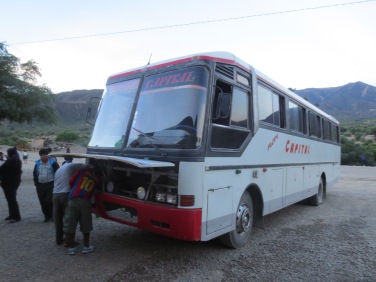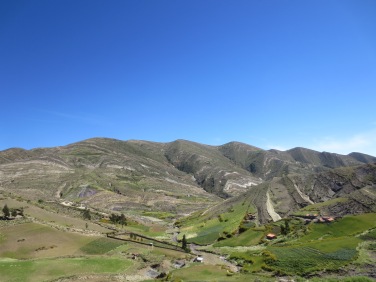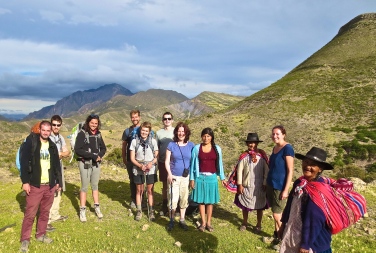“If it’s meant to be, it will be.” It was a mantra that I repeated over and over in my head when I found out the bus from Cochabamba to Sucre departed an hour later than I had originally thought. Normally an hour or even a day later wouldn’t have meant anything to me one way or the other. I’d been living without a clock for the last two and a half months – my perception of time was now related to where the sun rested in the sky rather than numbers on an electronic device. Today, however returned me uncomfortably to my former relationship with time: a frantic race, where every minute seemed to count against me.
Normally, I would have taken comfort when the ticket agent told me the bus would arrive in Sucre at 5:00 am, that would have given me exactly enough time to get from the bus terminal to Condortrekker’s office where I would meet my group 45 minutes later and set off for a three-day/two-night hike through Maragua Crater. However, Bolivian bus ticket salesmen are notorious for being very adapt and clever when it comes to negotiating a deal. They’ll say whatever they think it is you want to hear so you’ll pick their company over their rivals. “Want a fully reclining seat? No problem, we got it! Want a new, state-of-the art bus with wi-fi, air conditioning, mp3 player, dvd player, oh and did we mention fully reclining seats? Not a problem . . . pick us, we have it all!”
I never should have asked the driver when our bus was supposed to arrive. He pretty much destroyed any remaining hope I had before I even sat down on my cramped and anything but fully reclining seat. “After six sometime. Why?” I told him I had to meet a tour group for a hike and I needed to be there by 5/5:30 at the latest, was it possible? He just grimaced and shrugged his shoulders, “I guess anything is possible.” But, his tone and demeanor suggested otherwise.
As the bus slowly trudged up the long twisty mountain roads, I tried in vain to go to sleep. Each time the driver taped the breaks or idled the engine my heart would race and fill with dread – every minute that passed furthered my resolution that this hike was not going to happen. In fact, when the bus pulled into Sucre at 6am I considered not even going by Condortrekker’s office, what was the point? But since their office was right by the main plaza, which in turn was close to the hostel I would most likely be booking for the night . . . I figured a might as well. The man in charge of seeing the group off had just fallen back to asleep when I knocked on the office door. “Alexander Lee?” He asked, and before I could say “yes” or correct my name, I was hustled into another cab, while he attempted to alert the tour guide that I would meet them somewhere on the road.
“Just look out for a bus stopped on the road with a bunch of tourists in it.” My new cab driver took his new directive very seriously as he tested the limits of how fast his antiquated vehicle could go. “Look, up a head, there’s a bus,” exclaimed the taxi driver as he slammed on the brakes and his tiny car sputtered and shook as it came to a welcomed halt. A small sigh-of-relief later, I was sitting on a small bus apologizing to the nine other hikers, the driver, and our guide. Looking out the window watching the city gradually yield and cede ground to the country and its vast expanse of emptiness – I realized that this hike was apparently meant to be.
If someone asked me why it was so important that I go on this hike? I’d honestly have to say, “I don’t know.” I had never even heard of the Maragua Crater or Condor Trekkers until a woman in a coffee shop passed me a flyer describing the hike and the company a few weeks prior. It’s not one of those places that people base their trips around like Machu Picchu or Patagonia. Nor is Condortrekker a name carries any currency – that is until you read the fine print on their brochure and spend a little time on one of their treks. Condortrekker is a non-profit organization whose mission is to give back to the local communities that they trek through. The boldly invite and challenge would-be trekkers on their brochure: “be more than just a tourist.” Whether its investing in local schools, infrastructure, or giving money to the communities to use as they see fit, their aim is to leave the communities a little better off than the founder of Condortrekker found them.
Our guide, Rogelio, though only 24 years-old, seemed much older and wiser than his age might suggest, was living and studying tourism in Sucre, but he had been born and raised in one of the communities close to the small villages we were hiking through. Rogelio had a first hand knowledge of what it was like living in this part of the world and he also had an understanding of the native language, Quechua. As we would pass by locals walking home from working on their land they would make their way towards our guide, smile large toothless smiles and hold out their hands in the form a small cup. Rogelio would pull out a large green plastic bag of coca leaves and fill the palms of their hands and they would happily tuck the leaves into their aprons, clothe bags, or simply start chewing on the leaves as they caught up on what was happening in the village and what nationalities were represented by our little group of hikers.
As we were hiking into the base of the Maragua Crater where we would spend the first night, Rogelio told us that with BiblioWork’s help, Condortrekker had just opened a library in one of the schools and the village had been throwing a small party to celebrate. As we passed a small family’s home, which also doubled as the town’s small convenience store- the lady of the house passed a cup of Chicha, a fermented corn drink found throughout the Andes to Rogelio. Before taking his first sip, out of respect for Pachamama, Rogelio titled his cup and let three small drops splash the earth beneath him, “that is for Pachamama, and this is for us,” he took a sip and passed the chicha around. We had officially been welcomed into the village of Maragua.
Though the incredibly beautiful scenery continued to change dramatically through out the duration of our hike, the living conditions of the farmers and their families did not. Though I had seen many improvised homes from the various windows from my bus travels during my time in Bolivia, this was the first time they weren’t just blending into the horizon as I passed by – I was experiencing it up close and the memory was much harder to shake from this proximity.
It wasn’t the type of poverty that stares at you glumly with moist wide-eyes in black-and-white on a television commercial that is asking for donations, this was poverty in vivid color. While trekking through the crater and the surrounding villages, I never saw a sullen face, in fact, it was rare to see people who weren’t smiling or inquisitively staring at the strangers walking through their land. People were always sharing stories, coca leaves, occasionally chicha – they were almost always laughing. Children were busy playing or chasing well-worn soccer balls as they made their way to or from school – a journey that for some students could be a two or three-hour commute in one direction. It was the type of poverty where people seemed too busy working and living to notice what they lacked. This isn’t meant to romanticize their situation, but their attitude wasn’t nearly as bleak compared to the image of their houses – structures left unfinished, incomplete, yet somehow well-worn.
On our last night in a small city named Potolo, after walking to the town’s desolate plaza where I watched a dog wrestle with a plastic water bottle, I tried to piece together an answer to my own question: Why was this hike so important for me to complete? Sometimes, just being outdoors – humbled by the immense beauty of nature and accomplishing a task like climbing a mountain can restore a sense of balance with-in me. And after zigzagging across Bolivia by bus, I needed to be outdoors, in touch with nature.
And sometimes, often when we least expect it, we are placed in situations where our world-views are challenged, where we are given the ability to see things from a new perspective. And that is exactly what I found nestled in the middle and the surrounding villages of the Maragua Crater. I found people living life fully and richly despite the materials they may or may not possess. I found that I had been blessed beyond measure to have the means that allowed me to walk through their land and their lives for three short days. Blessed that I can travel. Blessed that I have options. And, blessed that I can help change things for the better in others’ lives.
Later that night, after we all shared our last meal together and talked about the beauty of the land and where we thought our travels would take us next, I slipped out to the kitchen where Rogelio was washing dishes. I asked if it would be possible to talk to him for a few minutes to find out more about his life and his experiences.
Here is his story:
Name: Rogelio Mamani Rodriguez
Age: 24
Occupation: Guide for Condortrekkers and Student
How long have you been with Condortrekkers? Three and a half years. And how did you start working for Condortrekkers? When I started with Condortrekker . . . they found me. I worked in the cemetery as a guide. And they came to me because Randell and Emilio wanted to start the project to help the communities and they ask me if I wanted to work with him and if I wanted to help them start the project. And, I started with them.
Do you like working as a guide? Yeah. Yeah, I like it . . . this is my life because when I was thirteen years old I worked in the cemetery as a tour guide in Sucre. And I spoke about the important people who are in the cemetery, for example, ex-presidents.
Do you miss living in the communities or do you prefer living in Sucre? I like both places because I like speaking with the different people living here in the communities in Quechua, for example. I like living in Sucre because I study there and I have my friends there. Sucre, for me is comfortable, but I like both places.
Is it hard leaving your friends for two or three days at a time and then turn around and leave to do another trek? No, for me it’s not a problem. When I started it was a little hard. But now its easier for me. I know the places very well and it’s not very hard.
You learned Quechua from your parents? My father speaks Quechua, my mother . . . is dead. For me, my first languages is Quechua, then after Spanish.
How do the people living in the communities view all the tourists walking through their farms and villages? Yes, well for the people they are happy, I think. Because they can sell their textiles sometimes and they have stores and normally the tourist buy from the shops. For most people its very good. For example, when you arrive to the hostel, it’s for the communities and when you pay to stay there you are helping the communities. Also, Condortrekkers is helping the students and the different schools in the communities. They are happy.
Can you tell me a little bit about your experiences as guide? I am the first guide for Condortrekkers. Oh really, and you are so young. Yeah. I started Condortrekkers with Randall, the founder.
And what are you studying in University? Tourism. Now, French and a little English.
What do you want to do when you finish university? For the moment I want to stay with Condor but after three or four years, I would like to open my own agency.
Do you like working with the tourists? Yes, I like everybody. There are different tourists, but every trek is more or less a new experience for me because of all the different tourists. And it’s very good. I like my job. It’s my job. Sometimes I have problems, but they aren’t very big. I can always find solutions.
How has life changed for the people living in the communities that we’ve walked through since you started working with this organization? The people are better now because in different towns they have more projects. In these small communities the people need to work – they need money, maybe they have to leave and go to Sucre for work, but those who have to leave for work, normally don’t return to live in the communities. Every family . . . for some people it’s good because their daughter or their son needs to study for the future, maybe for them it’s good. For me it’s good, if I was living in the communities, I would like my children to go to Sucre and study and then after they can work in an important place. I think they think they same as me.








Really loved reading this. I was a volunteer for Condor Trekkers in 2011 and it brought back lots of memories. I love how they went out of their way to get you onto your tour and it’s lovely that you interviewed Rogelio (one of my favourite guides – an awesome cheeky chappy!) I hope you enjoy the rest of your travels. Here’s my write-up of Condor Trekkers if you’re interested: http://tomnixon.co.uk/2012/03/05/condor-trekkers/
A very well written blog and it bought back lots of memories from when I did a similar tour with Rogelio back in January. Condortrekkers are a great company